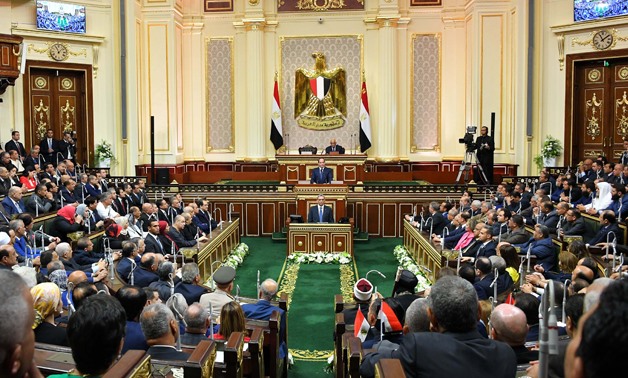
File- President Sisi gives a speech at the House of Representatives downtown Cairo on Saturday, June 2, 2018, after he swore in for a second term in presidency - Press photo
CAIRO- 8 May 2022: Egypt’s House of Representatives approved on Sunday an Agreement on Financing the Sustainable Transformation for Agricultural Resilience in Upper Egypt (STAR) between Egypt and the International Fund for Agricultural Development (IFAD) that was signed in Rome on 28/1/2022 and in Cairo on 9/2/2022.
The agreement aims to improve the living standards of Upper Egyptians in Minya, Assiut, and Sohag. It supports them to face water scarcity and climate change impacts in the future.
The program also aims to raise the efficiency of agricultural methods, create a sustainable agricultural environment, and improve the incomes of smallholders and landless families. “This will be done through better marketing linkages, sustainable and climate change-adapted agricultural intensification: development of small rural businesses; and Inclusive policies and strategies that build on the untapped potential of women and youth as resources for family resilience,” said IFAD on its official website.
“It will provide services to 240,000 poor rural households, of which 160,000 smallholder households will receive the full set of STAR services and 80,000 households will benefit from the STAR-supported rehabilitated water infrastructure,” IFAD continued.
The total cost of the project is estimated at US$ 269.64 million, including US$ 64.54 million financed by the IFAD. Meanwhile, the international co-financiers include OPEC Fund for International Development with US$ 20 million, the World Food Program (WFP) with US$ 9.87 million, the Adaptation Fund with US$ 2.87 million, the African Development Bank with US$ 90.04 million. The domestic co-financiers are the Egyptian Government with US$ 15.46 million, local beneficiaries with US$ 12.76 million, and local private sector with US$ 54.1 million.
In an interview with IFAD Country Program Manager for Egypt Mohamed Elghazaly in February 2021, he said that the COVID-19 had its negative impacts on IFAD’s operations in Egypt, but, the impact was minimal since they "had a business continuity plan that was developed before the outbreak of cases in Egypt."
The study of the COVID-19 impact on IFAD's ongoing projects in Egypt was conducted in cooperation with the Food and Agriculture Organization (FAO), International Food Policy Research Institute (IFPRI), United Nations Industrial Development Organization (UNIDO), and the WFP, the IFPRI said on February 21, 2021.
Comments
Leave a Comment